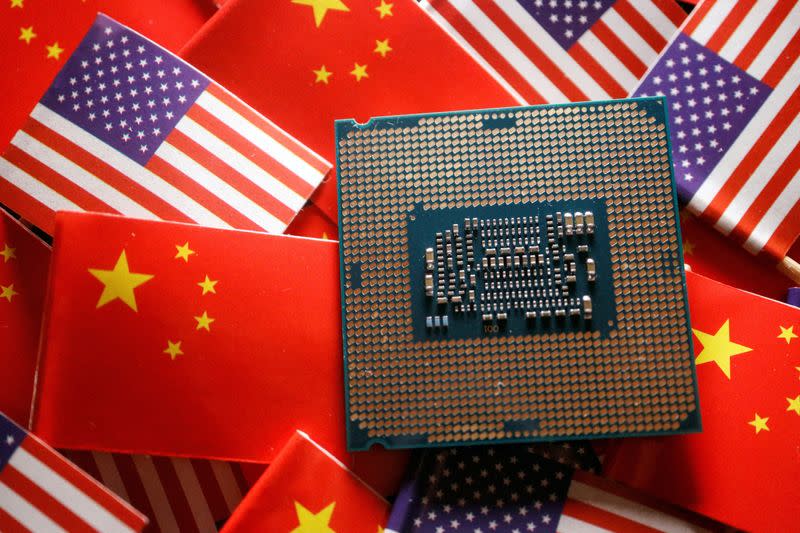A Chinese chip design firm, partly owned by blacklisted chipmaker SMIC, is buying US software and backed by groups in America, despite providing tech services to numerous Chinese military entities.
An investigation into work and services being done by Brite Semiconductor has sparked concern among influential politicians such as Senator Marco Rubio and analysts who say it highlights the difficulty that Washington faces when trying to block US support for Beijing’s chip sector and military.
A probe by Reuters into company statements, regulatory filings, tenders and academic articles by People’s Liberation Army (PLA) researchers and institutions found that Brite offers chip design services to at least six Chinese military suppliers.
ALSO SEE: China, Vietnam Sign Rail and Data Deals, While Upgrading Ties
Its second largest shareholder and top supplier is China’s top chipmaker SMIC, which was put on the US Entity List over alleged ties to Beijing’s military, effectively barring it from receiving some goods from US suppliers.
Despite those relationships, Brite boasts funding from a US venture capital firm backed by Wells Fargo and a Christian university, and has continued access to sensitive US technology from two California-based software companies, Synopsys and Cadence Design, documents showed.
Reuters says it found no evidence that Brite’s relationships with US firms violate any regulations, but its findings have spurred concern.
The Biden administration, with bipartisan support, has taken pains to stop the flow of technology and investment to Bejing’s chip sector, unveiling rules last October to halt some US exports of chips and chipmaking tools to China and in August announcing a ban on certain new US investments in the industry. It has also added dozens of Chinese companies to the Entity List, many over ties to China’s military.
Brite did not respond to requests for comment. The Commerce Department and the White House declined to comment. The Chinese Embassy in Washington did not comment on Brite but accused the US of “blatant economic coercion and bullying in the field of technology.”
Low-profile firms used to skirt export bans
Although not an apparent breach of any US rules, Brite’s access demonstrates the challenges that Washington faces in trying to keep US equipment and money from being used to advance China’s military ambitions – and suggests that the US will struggle to succeed unless it targets many more companies that have slipped under its radar.
Republican Senator Marco Rubio, an influential China hawk and member of the foreign relations committee, characterized Reuters’ findings on Brite as “concerning.”
“Companies connected to China’s military supply chain should not have access to American technology and investment. The Biden Administration’s haphazard approach to export controls and investment restrictions clearly is not working,” he said.
Others said Brite illustrates Beijing’s ability to use low-profile companies to skirt American export bans on big-name Chinese firms.
“Brite is a classic example of how a US-China joint venture could end up funneling valuable semiconductor technology to SMIC and the PLA,” Martijn Rasser, managing director of Datenna, an open-source intelligence company, said.
China’s defence ministry and SMIC did not respond to questions about their relationships with Brite.
SMIC Co-CEO is Brite’s board chairman
Semiconductor Manufacturing International Corporation (SMIC), which holds a 19% stake in Brite, has long been in Washington’s crosshairs. The Trump administration added it to a list of “military end users” in November, 2020.
Next, SMIC was added to the ‘Entity List’ over its apparent ties to the Chinese military industrial complex. SMIC has previously denied any ties to China’s military, saying that it manufactures chips and provides services “solely for civilian and commercial end-users and end-uses.”
Brite Semiconductor, founded in 2008 as a joint venture between US venture capitalists and Chinese firms, has longstanding ties to SMIC.
SMIC was Brite’s largest shareholder until last year. That stake turned Brite into “a bridge between China’s no-1 foundry SMIC” and other companies with chip design needs, according to a presentation on its website. The 2021 presentation also notes that SMIC’s Co-CEO serves as Brite’s current chairman of the board.
Nearly 85% of the funds Brite Semiconductor paid to all suppliers for goods and services last year went to SMIC, according to its October IPO prospectus.
Chips designed for navy, PLA units, drones
Beyond its links to SMIC, Brite sells its chip design services to Shanghai-based ComNav Technology, which makes satellite navigation systems for the Navy and the Strategic Support Force, the PLA unit that oversees information, electronic, and cyber warfare, according to a Reuters review of articles authored by PLA researchers and military tenders.
Brite accounted for over 71% of ComNav’s total prepaid procurement bill, payments to suppliers made in advance, at the end of last year, according to a prospectus filed by ComNav in June.
ComNav relied on Brite to outsource the packaging, testing and manufacturing for a chip used in ComNav’s K8 high-precision GPS product series, designed for machine control, robotics, and drones, among other uses, according to its website.
ComNav’s K8 system was used by two PLA researchers according to a review of Chinese-language academic literature published in the past two years. ComNav did not respond to requests for comment.
Slipping under the radar
Chinese tech companies with links to the Chinese military often get added to the Entity List, but Brite has never faced such restrictions, public records show.
“It sure seems like they would be a candidate for an Entity listing,” said Emily Kilcrease, a former trade official now at the Center for a New American Security, after reviewing Reuters’ findings.
The United States has created new obstacles for US suppliers to send technology to Chinese companies involved in the production of advanced chips, even when they are not entity listed.
After SMIC was added to the entity list, Brite’s US suppliers needed to get a US licence before shipping it items used for designing chips to be made at SMIC.
And new rules released last year would have barred Brite from receiving such items if they were meant to be used in designing advanced chips to be made at Chinese manufacturers.
Brite planning Shanghai IPO
Brite has maintained its relationships with suppliers of top chip design software Cadence and Synopsys, Brite’s October prospectus for its Shanghai exchange IPO shows.
Reuters was not able to determine whether the US companies received licences to ship equipment to Brite, as the new rules require. Both companies said they are in compliance with U.S. regulations.
From January to June of this year, the company spent 14 million yuan ($2 million) on software from Synopsys, making the US company one of its top 5 suppliers.
And last year, Cadence ranked as one of Brite’s top five suppliers, with Brite spending 11.8 million ($1.6 million) yuan on its chip design software, according to the prospectus.
Both Synopsys and Cadence said they are in full compliance with US export controls and did not confirm or deny their relationships with Brite, although Synopsys mentions its business dealings with Brite on its website.
US venture capital group, Christian college
The White House unveiled an executive order last August targeting US investment in advanced Chinese chipmaking and other tech industries, fearing the capital and know-how could end up helping Beijing bolster its military.
Norwest Venture Partners, whose stake in Brite is 99.7% backed by funds from Wells Fargo Bank, is the largest US investor in Brite.
Norwest participated in at least four capital raises worth over $66 million and held a board seat until 2020, giving it insight into and partial control over Brite’s business strategies. Its stake could be worth nearly $34 million, based on the IPO valuation Brite is seeking. Wells Fargo declined to comment.
Norwest said its initial investment was made 15 years ago and has been “held in compliance with applicable laws”. “The regulatory environment is changing, and we’re committed to following new regulations as they become effective,” the firm added.
Biola University, a Christian college in California, also has a 5.43% stake in Brite. Promod Haque, a managing partner at Norwest who sat on Brite’s board until 2019, according to his LinkedIn page, has also served on Biola’s board of trustees since 2007.
Haque did not respond to requests for comment on his links to Brite and Biola, while Biola declined to comment on its investment in Brite.
Norwest and Biola University will not run afoul of new rules fleshing out the restrictions on investments in China because those measures will not hit pre-existing investments, lawyers who are experts in foreign investment regulations said.
Brite’s relationship with SMIC may also affect its financial future in China. Brite, which saw revenue growth of 36% last year to 1.3 billion yuan (close to $179 million) is seeking to list its shares on the Shanghai stock exchange, the prospectus showed.
Exchange questioned Brite’s independence from SMIC
But in October, the exchange suspended the process, seeking more information about Brite’s independence from SMIC. At issue is whether SMIC is taking advantage of its role as Brite’s top supplier and part owner to overcharge Brite.
The exchange, which is set to review Brite’s listing on December 18, asked Brite to clarify why SMIC sold it wafers, or silicon discs, at a higher-than-average price. Brite said in a filing on Monday that wafers are highly customized products whose prices are affected by the size of a purchase and supply and demand.
The Shanghai stock exchange did not respond for a request for comment on Brite’s IPO process.
Regardless of the stock exchange’s final decision, Brite will likely continue to enjoy access to US technology and investment, despite SMIC’s addition to the entity list.
“It is time to reimagine the economic policy toolkit that we have,” said Greg Levesque, CEO of security firm Strider Technologies, which examines open source data to find foreign technology that is at risk of being stolen by China.
“We are really good at putting names on lists, but we need to be more aggressive in identifying and combating this behaviour,” he added.
- Reuters with additional editing by Jim Pollard
ALSO SEE:
Blacklisted China Chip Giant SMIC Earned $1.5bn in US – WSJ
China Exploiting Open Source RISC-V Chip Tech, Warn Senators
US Set to Close Loopholes in Curbs on Chip Tools For China























